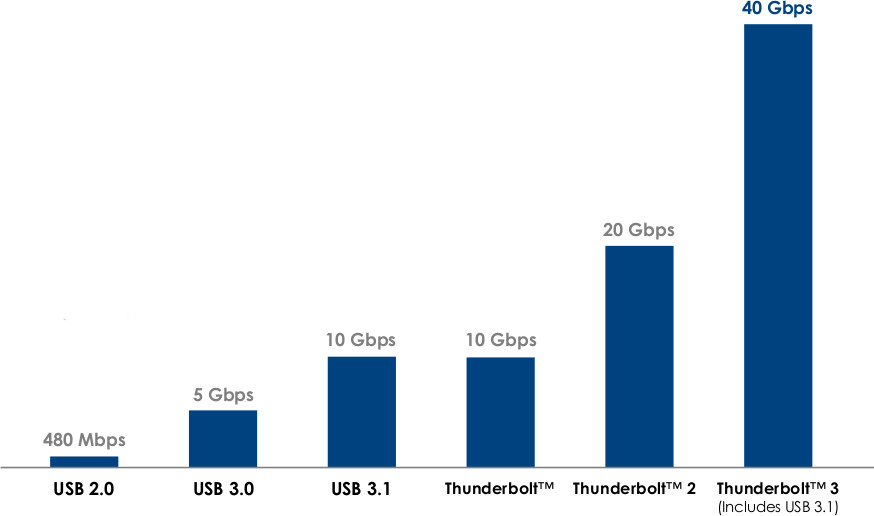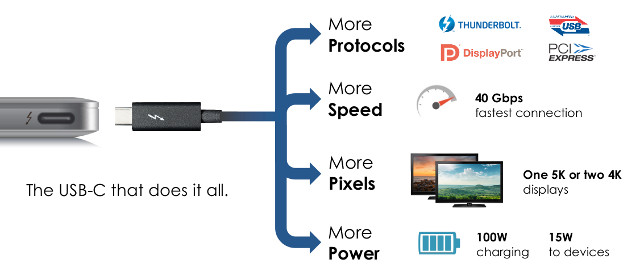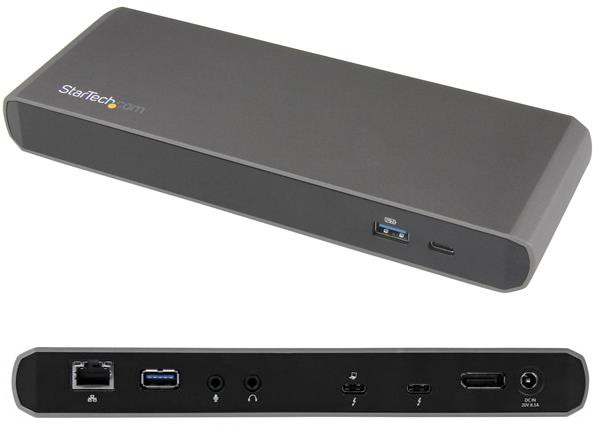Intel Thunderbolt 3 is a single port connect that supports multiple standards (Thunderbolt, USB 3.1, DisplayPort, PCIe), leverages USB-C connector, and offers up to 40 Gbps throughput. So far, it’s mostly found in higher end computers and laptops, but Intel has now announced plans to make it royalty-free, and “release the specifications to the industry” (so maybe not completely free/public) in order to increase adoption of the standard.
- Thunderbolt, USB, DisplayPort, and power on USB-C
- USB-C connector and cables (small, reversible)
- 40 Gbps Thunderbolt 3 – double the speed of Thunderbolt 2
- Bi-directional, dual-protocol (PCI Express and DisplayPort)
- 4 lanes of PCI Express Gen 3
- 8 lanes of DisplayPort 1.2 (HBR2 and MST)
- Supports two 4K displays (4096 x 2160 30bpp @ 60 Hz)
- USB 3.1 (10 Gbps) – compatible with existing USB devices and cables
- DisplayPort 1.2 – compatible with existing DisplayPort displays, devices, and cables
- Connect DVI, HDMI, and VGA displays via adapters
- Power (based on USB power delivery)
- Up to 100W system charging
- 15W to bus-powered devices
- Thunderbolt Networking
- 10Gb Ethernet connection between computers
- Daisy chaining (up to six devices)
- Lowest latency for PCI Express audio recording
 That means eventually we may get devices with a single Thunderbolt/USB-C like smartphones to connect all peripherals including 4K displays, NVMe SSDs, Ethernet, external GPU, etc.., and power/charge the device though a Thunderbolt 3 dock, which can be purchased for $200 and up. One example is StarTech.com Thunderbolt 3 Docking Station with 4K display, Ethernet, Audio and USB ports going for $199.99 on Amazon US.
That means eventually we may get devices with a single Thunderbolt/USB-C like smartphones to connect all peripherals including 4K displays, NVMe SSDs, Ethernet, external GPU, etc.., and power/charge the device though a Thunderbolt 3 dock, which can be purchased for $200 and up. One example is StarTech.com Thunderbolt 3 Docking Station with 4K display, Ethernet, Audio and USB ports going for $199.99 on Amazon US.
Intel also announced plans to integrate Thunderbolt 3 into future Intel CPUs.

Jean-Luc started CNX Software in 2010 as a part-time endeavor, before quitting his job as a software engineering manager, and starting to write daily news, and reviews full time later in 2011.
Support CNX Software! Donate via cryptocurrencies, become a Patron on Patreon, or purchase goods on Amazon or Aliexpress






